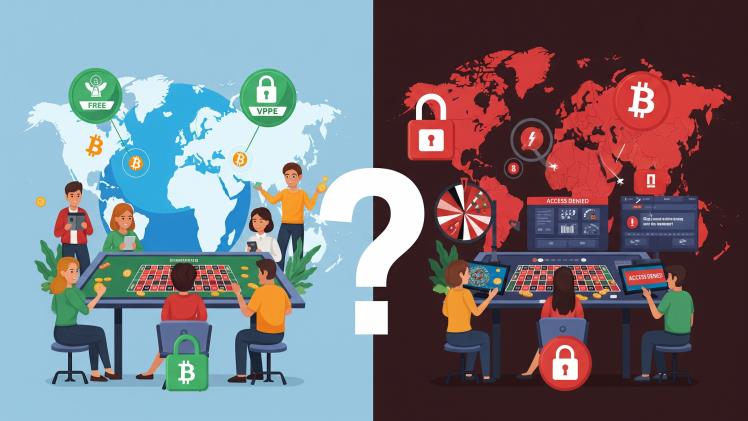
VPN restrictions create significant barriers for players attempting to access bitcoin roulette platforms from jurisdictions where cryptocurrency gambling faces legal limitations or outright prohibitions. Gaming operators implement sophisticated detection systems that identify and block VPN traffic to comply with regional licensing requirements and avoid regulatory penalties. These technological countermeasures directly impact player accessibility, forcing users to navigate complex workarounds or abandon gaming activities entirely across multiple international markets.
bitcoin live roulette faces particular challenges when implementing VPN restrictions because real-time gameplay requires stable connections that disrupt VPN blocking. Many operators must balance regulatory compliance with user experience, leading to inconsistent enforcement policies that create confusion for international players. The global nature of cryptocurrency contrasts sharply with jurisdiction-specific gambling regulations, creating ongoing tensions between player accessibility and legal compliance requirements that affect millions of potential users worldwide.
Geographic blocking methods
Bitcoin roulette platforms employ multiple technical approaches to restrict access based on user location and prevent VPN circumvention:
- IP address geolocation – Databases identify country origins of connecting IP addresses and automatically block restricted regions
- DNS filtering – Domain name system blocking prevents users from resolving gambling site addresses within prohibited jurisdictions
- Deep packet inspection – Advanced network analysis identifies VPN protocols and encrypted traffic patterns characteristic of proxy services
- Browser geolocation APIs – Web-based location detection through GPS, WiFi positioning, and cellular tower triangulation
- Time zone verification – Cross-reference stated locations with device time settings to identify geographical inconsistencies
- Language preference analysis – Monitor browser language settings and keyboard input patterns that may contradict claimed locations
These blocking methods operate in combination to create multiple verification layers that complicate VPN-based access attempts while maintaining legitimate user accessibility for players in permitted regions.
VPN detection techniques
Modern bitcoin roulette platforms utilize sophisticated technologies to identify and block virtual private network usage:
- Known VPN server databases – Maintain updated lists of commercial VPN service IP addresses and automatically block connections from identified servers
- Traffic pattern analysis – Monitor connection behaviors, bandwidth usage, and routing characteristics typical of VPN services
- Port scanning methods – Identify open ports and services commonly associated with VPN server configurations
- Connection latency analysis – Measure response times that indicate traffic routing through intermediate VPN servers
These detection systems continuously evolve to counter new VPN technologies and circumvention methods developed by users and commercial service providers.
Regional access workarounds
Players develop various methods to circumvent VPN restrictions and access bitcoin roulette platforms despite geographic limitations. Residential proxy services utilize legitimate home internet connections that appear as regular consumer traffic rather than commercial VPN servers, making detection significantly more difficult for platform operators. Mobile network access leverages cellular data connections with different geographic routing compared to fixed broadband services, often bypassing location-based restrictions.
Browser-based solutions employ web proxies, specialized extensions, and mirror sites that avoid sophisticated detection systems through distributed access points. Decentralized VPN networks use peer-to-peer services that distribute traffic across user devices rather than centralized servers, creating detection challenges for traditional blocking methods. Advanced users may employ Tor network access to route connections through anonymization networks that obscure both location and traffic patterns effectively.
VPN restrictions fundamentally reshape bitcoin roulette accessibility by creating technological and legal barriers that vary dramatically across jurisdictions and platforms. While operators must comply with complex regulatory requirements, players continue developing sophisticated circumvention methods that challenge enforcement effectiveness. This ongoing technological change ensures that VPN restrictions remain a dynamic factor influencing global bitcoin roulette accessibility patterns, affecting millions of players worldwide who seek cryptocurrency gambling opportunities across international boundaries.